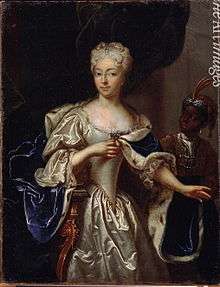Charlotte Christine of Brunswick-Lüneburg
| Charlotte Christine of Brunswick-Lüneburg | |
|---|---|
| Tsarevna of Russia | |
 Charlotte Christine of Brunswick-Lüneburg | |
| Born |
28 August 1694 Wolfenbüttel, Germany |
| Died |
2 November 1715 (aged 21) Saint Petersburg, Russia |
| Burial | Peter and Paul Cathedral |
| Spouse | Tsarevich Alexei Petrovich of Russia |
| Issue |
Grand Duchess Natalia Alexeievna Peter II of Russia |
| House | Welf |
| Father | Louis Rudolph, Duke of Brunswick-Lüneburg |
| Mother | Princess Christine Louise of Oettingen-Oettingen |
| Religion | Lutheranism |
Charlotte Christine Sophie also known as Sophie Charlotte or simply Charlotte (28 August 1694, Wolfenbüttel – 2 November 1715, Saint Petersburg), was the wife of Tsarevich Alexei Petrovich of Russia. She was the daughter of Louis Rudolph, Duke of Brunswick-Lüneburg and Christine Louise of Oettingen-Oettingen. She was also the great aunt of Marie Antoinette.
Biography
Charlotte Christine was brought up at the court of the Polish King August II, whose consort Christiane Eberhardine of Brandenburg-Bayreuth was her distant kinswoman and also her godmother. She received a good education for that time period. In late 1709, Tsar Peter I of Russia sent his son Alexei to Dresden to finish his education. There, he met Charlotte for the first time. She seemed a good match to Tsar Peter for his son because her elder sister Elizabeth Christine was married to the Holy Roman Emperor Charles VI, and the support of Austria in the upcoming fight with the Turks was appreciated by Russian diplomats.
On 25 October 1711 at Torgau, Charlotte Christine married Tsarevich Alexei, eldest son and heir of Peter I of Russia by his first wife Eudoxia Lopukhina. She was allowed to keep her Lutheran faith, but any children would be raised as Russian Orthodox. This marriage was the first to break the old tradition of the Russian imperial family of only marrying women from the Russian nobility. Thus Charlotte was the first member of the Russian imperial family who came from a foreign European dynasty since Zoe Palaiologina. In 1713 she arrived in Russia.
Charlotte enjoyed the favour of Tsar Peter the Great, but lived an isolated life with her own court, which was composed almost entirely by foreigners and headed by Juliana Luise von Ostfriesland. In the beginning her marriage to Alexei was happy, but his drunkenness soon began to strain their relationship. He also had an open affair with Yefrosinya Fedorov which started during Charlotte's lifetime and continued after her death. Charlotte found some consolation in the birth of a daughter, Natalia, and a son, later Peter II of Russia. She died a few days after the birth of her son. Both her daughter and son died without issue.
Fiction
Some fifty years after her death, a legend developed, according to which Charlotte did not die in 1715 and, instead of her corpse, a wooden doll was put in her coffin. According to this, she fled to Louisiana, where she married a French officer named d'Auban, with whom she later moved to Paris, France. Later they moved to the island of Bourbon, and when d'Auban died, Charlotte returned to Europe, living in Paris and Brussels, Belgium, with a pension from her niece, Empress Maria Theresa of Austria. Heinrich Zschokke developed this legend into a novella, titled "Die Prinzessin von Wolfenbüttel"; Charlotte Birch-Pfeiffer wrote a libretto about it and Duke Ernest of Saxe-Coburg wrote an opera, "Santa Chiara", on the subject.
Ancestry
| Ancestors of Charlotte Christine of Brunswick-Lüneburg |
|---|
|
|